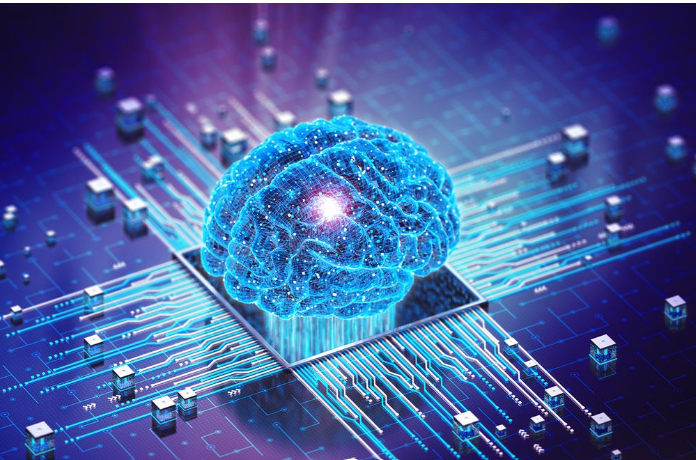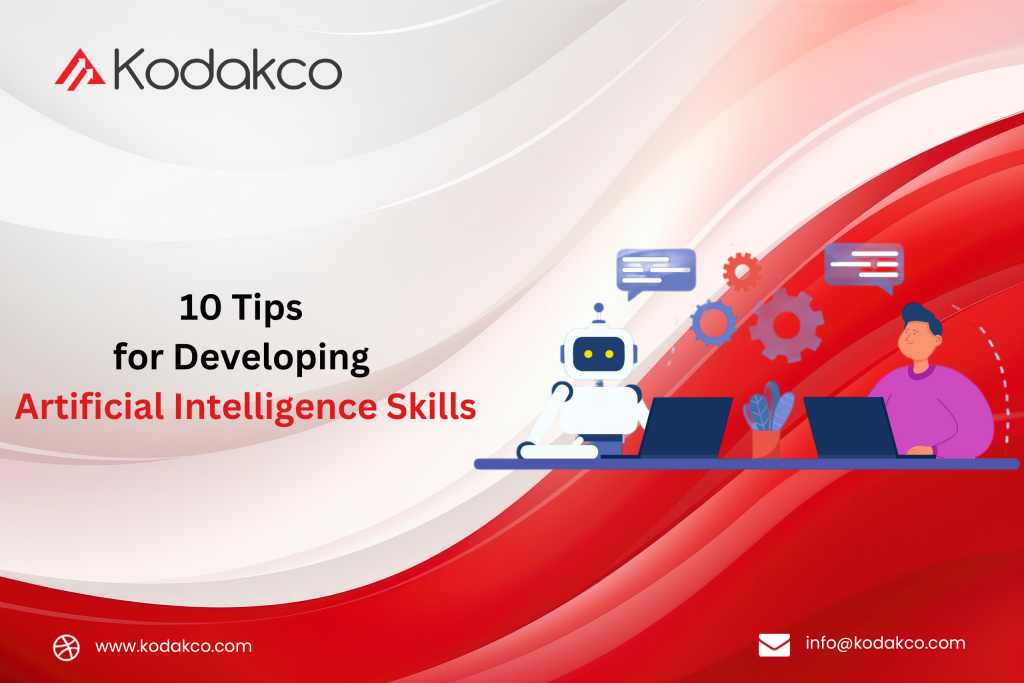AI-empowered Cyber Security solutions help monitor, analyze, and detect various cyber threats in real-time, including malware, ransomware, phishing attacks, etc. By integrating machine learning algorithms, Artificial Intelligence in Cybersecurity can analyze and identify patterns that indicate threats, initiate actions to prevent further damage, monitor and analyze behavior patterns, and create a baseline to restrict unauthorized access to the systems.

AI in Cyber Security: A Powerful Ally
Artificial Intelligence in Cybersecurity helps to reduce risk by detecting the possibility of malware and intrusions before they begin the process. When implemented properly, Artificial Intelligence in cyber security plays a dominant role in security automation and frees up the time and resources of the employees by using automated repeated tasks. AI also reduces the recurrence of errors by removing humans from major tasks or processes and reduces the time and challenges faced in particular tasks.
- Enhanced Threat Detection: AI can identify the patterns and analyze the amount of data and anomalies that create potential threats, it often detects the threats that normal methods do not do.
- Automated Response: AI automates security tasks by freeing human experts to focus on more strategic issues that are normally faced in our daily life.
- Proactive threat prevention: AI combines predictive analytics to anticipate threats and take prior measures to reduce risks.
- Reduced false positives: AI reduces false alarms by improving the overall effectiveness and efficiency of major security operations.
- Scalability: Artificial Intelligence handles large datasets and major complexities by ensuring protection for organizations of all sizes.
- Human AI collaboration: Cyber security solutions with AI analytical skills and human expertise help us to make strategic decision making.
What are the Key Roles of AI in Cyber security?
- Enhanced Threat Detection: AI algorithms analyze, and identify the patterns and anomalies that may indicate the cyber-attack. It enables the organizations to detect the overall threat earlier and more accurately than the traditional methods.
- Proactive Threat Prevention: AI can predict potential threats by analyzing previous historical data and emerging trends. This will help the organization to make proactive steps to prevent risks and attacks before they occur.
- Automated Incident Response: AI automates daily tasks such as identifying the root cause of the breach that affected the overall performance of the systems. It also frees up the security teams, helps focus on overall strategic activities, and monitors the response times.
- Improved Security Operations: AI can streamline various security operations using tasks like vulnerability scanning and patch management. It improves efficiency and reduces the risk of manual human errors.
Benefits of Using Artificial Intelligence in Cybersecurity
- Enhanced Threat Detection: AI can deduct threats in advance by improving the overall security options.
- Improved Efficiency: Artificial Intelligence helps to increase the overall efficiency of the system by automating the daily tasks
- Reduced Risk: It can help reduce the challenges or risks that threaten the function of the system by cyber-attacks
- Cost Saving: AI helps the organization save money by minimizing the time required for security operations.
What are the challenges faced while using Cybersecurity?
- Data Quality: AI models rely on high-quality data to be effective and efficient. Organizations should ensure that the data provided are accurate, complete, and reliable and represent the potential threats.
- Biased Data: Moreover, the AI algorithm can be biased if given biased data, and the result may be negative, impacting the accuracy of threat deduction.
- Complex Procedure: Models in AI are more complex and very difficult to understand. It is challenging to explain the decisions made by them and ensure that they don’t make mistakes.
Kodakco Cyber Security Courses
If you are looking for an online platform to upgrade your skills in technology consultation? Then choose Kodakco which covers various elements right from the basics to ethical hacking, risk management, and so on. Their Cyber Security courses are noteworthy, catering individuals to who specialize in various fields. By combining theoretical knowledge with practical exposure these courses empower you to become a skilled professional who is capable of safeguarding sensitive information from cyber threats.
Kodako offers two different courses in Cyber Security
- Post Graduate Program in Cyber Security
- MBA in Cyber Security by College de Paris

1. Post Graduate Program in Cyber Security:
This program was designed by the experts Kodakco to upgrade the skills of students in the cybersecurity field. It also provides real-time training in cyber security, ethical hacking, and so on.
Key Features:
- Students receive a government-authorized certificate that is recognized all over the world after completion of this course.
- This course comes with real-time projects and assignments that will help the students to get global exposure.
- Students will gain practical exposure and a deep knowledge of the various tools in this field.
By applying this theoretical knowledge with practical exposure, the Post Graduate Program in Cyber Security empowers students to become skilled professionals. This will also allow them to safeguard sensitive information from cyber threats.
2. MBA in Cyber Security by College de Paris
MBA in Cyber Security by College de Paris, offered by Kodakco, is an intensive program that is designed to enhance learners’ skills and knowledge required in the field of cyber security. This program combines academic excellence and practical exposure to provide the students with an all-rounded learning experience and to upgrade their skills in the cybersecurity field.
Key Features
- Upon completion, learners will receive a prestigious MBA Cyber Security certification from the College of de Paris which is popular by employers worldwide.
- Learners do have access to Kodakco’s Learning management system for a year, which provides them with resources to enhance their learning skills.
- Monthly Master Class Sessions: The program’s monthly master class sessions are conducted by experts and offer valuable insights and practical exposure.
- Updated Study Material: Learners are to receive an up to date study materials according to the latest trends of cyber security.
- Kodakco provides 100% placement assistance that will help the learner secure an internship and full-time job in this field.
- Kodakco also provides internship opportunities for freshers to gain practical exposure and apply their knowledge in real-world settings.
However, an MBA in Cyber Security from the College de Paris will provide the students with practical exposure to become a highly qualified professional in the field. They will be capable of inducing various tricks that will help the organization from cyber threats.
Conclusion
Artificial intelligence in cybersecurity automates tasks that will detect threats in real-time situations and minimize the impact of cyber-attacks on systems. However, the effectiveness depends upon the quality of the data and ethical considerations. As cyber security evolves, AI does play a dominant role in safeguarding the digital world. AI not only helps analyze threat identification but also helps professionals minimize risk and identify malware attacks beforehand. Despite its disadvantages, AI also helps cyber security improve the overall performance of the organization and its security posture.
Recommended Reads
- Ethical Hacking v/s Cybercrime: Drawing the Line
- What Is Cyber Trolling? – Preventions And Different types
- How To Become An Information Security Manager
- Top 10 Ethical Hacking Books
- Cybersecurity Threats and Attacks: All You Need to Know
FAQs
Ans: Cyber security is an automated task that protects your computer network and data from unauthorized access.
Ans: A few common types of threats are malware, phishing, ransomware, SQL injection, and so on.
Ans: To protect your system, use strong passwords, be cautious about clicking on suspicious links or attachments, keep the software of your system up to date, and beware of scams.
Ans: AI is used in various tasks like threat detection, anomaly detection, incident response, and so on.
Ans: The benefits include minimization of threat detection, faster response times, and reduced overall human error.


